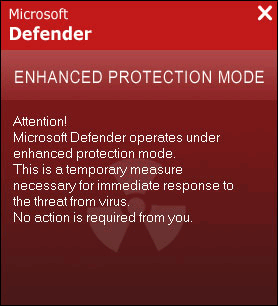'You Might Recently Browsed To Compromised Websites' POP-Up Scam
After thoroughly examining the 'You Might Recently Browsed To Compromised Websites' message, cybersecurity researchers have unequivocally identified it as a scheme. The deceptive message asserts that the user's device may have been infected as a result of visiting potentially fraudulent websites.
It is essential to underscore that these claims are entirely unfounded, and the source of the message is in no manner connected to any legitimate products, services or reputable companies. Such schemes of deceit commonly aim to promote untrustworthy and harmful software, exploiting users' concerns about their device security for unsafe purposes. Users are advised to treat such messages with skepticism and refrain from taking any actions suggested by these deceptive alerts.
The 'You Might Recently Browsed To Compromised Websites' POP-Up Scam Tries to Scare Users with Fake Alerts
Upon accessing a Web page hosting this deceptive scheme, users are confronted with a pop-up window masquerading as a 'safety warning' purportedly issued by a reputable security company. The warning alleges that there's a potential risk because the user may have recently visited compromised websites, resulting in their device being infected with viruses. The false alert specifically suggests that the visited sites could include illegal streaming or adult-oriented content. To address this supposed threat, users are encouraged to conduct a security scan to eliminate potential threats. It's crucial to emphasize that all the information presented by this scheme is entirely fabricated.
While it's true that computers can be compromised through exposure to unsafe websites, the claims asserted by this scheme lack any factual basis. Despite the carefully crafted language employed by the fraudsters, the underlying tactic remains a scare strategy designed to manipulate victims into taking specific actions.
In many instances, fraudulent threat alerts and system scans serve as a conduit for endorsing dubious software. The promoted applications can range from fake anti-malware programs and browser hijackers to adware and various Potentially Unwanted Programs (PUPs). Additionally, some of these schemes have been identified as spreading more severe forms of malware, such as Trojans and ransomware.
It's important to note that these tactics aren't limited to endorsing unsafe software; they can also promote ostensibly legitimate products and services. In such cases, the objective is to exploit legitimate content's affiliate programs, allowing fraudsters to earn commissions illegitimately. Users are advised to exercise caution and skepticism when encountering such alarming messages and to avoid taking any actions suggested by these deceptive alerts. Regularly updating and using reputable security software can further enhance protection against potential threats.
Websites are not Capable of Carrying Out Malware Scans of Users' Devices
Websites are not capable of independently carrying out malware scans of users' devices for several reasons:
- Limited Access to Device Resources: Websites operate within the confines of a user's Web browser, which has limited access to the resources of the user's device. Security measures and privacy restrictions prevent websites from directly scanning the files and processes on a user's device.
- Browser Sandbox Environment: Browsers operate within a sandbox environment to enhance security. This isolation restricts the direct interaction between the website and the underlying operating system, preventing unauthorized access to sensitive system components.
- Privacy and Security Concerns: Allowing websites to conduct scans of a user's device raises significant privacy and security concerns. Granting such access could potentially expose sensitive information to fraud-related actors or unauthorized third parties, leading to privacy breaches and security risks.
- User Consent and Permissions: Conducting a malware scan requires a level of access and control over a user's files and processes that goes beyond what websites should be allowed to do without explicit user consent. For security reasons, browsers do not provide websites with the necessary permissions to perform such invasive actions.
- Resource Intensiveness: Malware scans are resource-intensive processes that typically require specialized software running directly on a user's device. Websites lack the capability to run complex scanning algorithms or access the computing power necessary for comprehensive malware detection.
- Diversity of Devices and Operating Systems: Devices and operating systems vary widely, making it challenging for websites to develop a universal scanning mechanism that works seamlessly across all platforms. Different devices and operating systems have different security architectures and protocols.
- Legal and Ethical Constraints: Conducting malware scans without explicit user consent may violate legal and ethical norms. Such actions could be interpreted as unauthorized access or intrusion into the user's device, potentially leading to legal consequences for the website.
To ensure the security of their devices, users are encouraged to rely on dedicated anti-malware software installed on their devices. These programs have the necessary permissions and access to scan and detect potential threats effectively. Regularly updating software, using secure passwords, and practicing safe browsing habits are also crucial components of maintaining a secure online environment.


